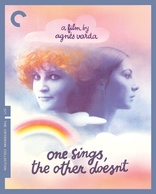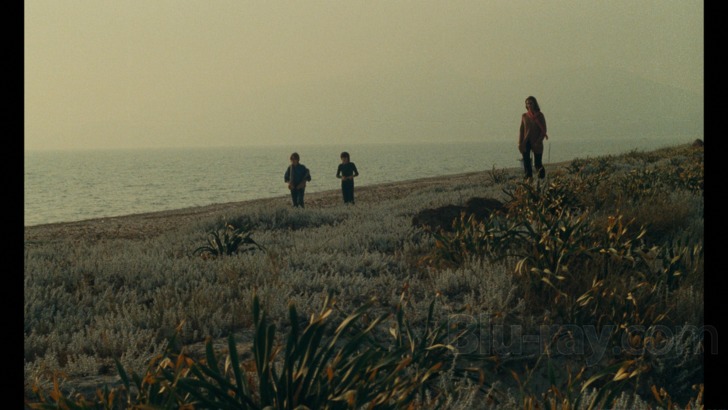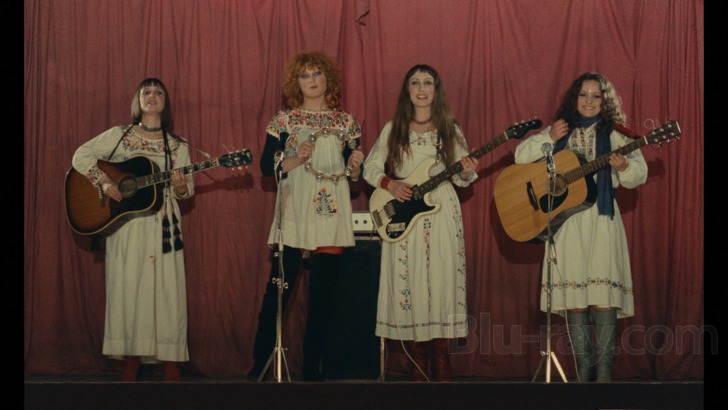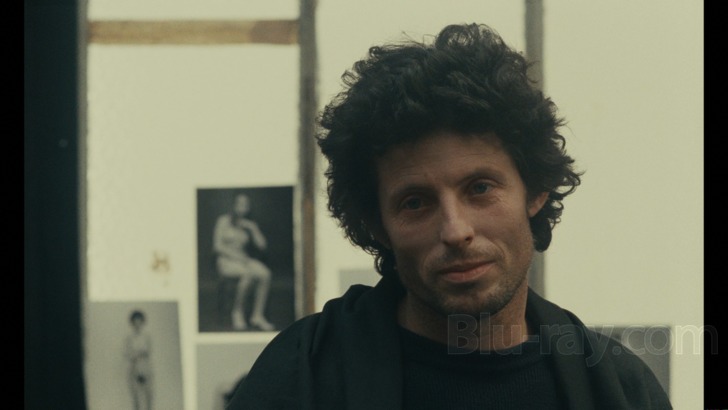One Sings, the Other Doesn't Blu-ray Movie
HomeOne Sings, the Other Doesn't Blu-ray Movie 
L'une chante, l'autre pasCriterion | 1977 | 121 min | Not rated | May 28, 2019

Movie rating
6.5 | / 10 |
Blu-ray rating
| Users | 0.0 | |
| Reviewer | 4.0 | |
| Overall | 4.0 |
Overview
One Sings, the Other Doesn't (1977)
When seventeen-year-old Pauline helps struggling mother of two Suzanne procure the money for an abortion, a deep bond forms between the two, one that endures over the course of more than a decade as each searches for her place in the world.
Starring: Thérèse Liotard, Valérie MairesseDirector: Agnès Varda
| Foreign | Uncertain |
| Drama | Uncertain |
Specifications
Video
Video codec: MPEG-4 AVC
Video resolution: 1080p
Aspect ratio: 1.66:1
Original aspect ratio: 1.66:1
Audio
French: LPCM Mono (48kHz, 24-bit)
Subtitles
English
Discs
Blu-ray Disc
Single disc (1 BD)
Playback
Region A (locked)
Review
Rating summary
| Movie | 4.0 | |
| Video | 4.5 | |
| Audio | 4.0 | |
| Extras | 4.0 | |
| Overall | 4.0 |
One Sings, the Other Doesn't Blu-ray Movie Review
Their bodies, themselves.
Reviewed by Jeffrey Kauffman August 4, 2019If you were a guy who was around in the early seventies and had a girlfriend, wife, or really any kind of female acquaintance who was at least in
her teen years, chances are you had some passing familiarity with a book called Our Bodies, Ourselves which seemed to be de
rigeur for women back then, whether or not they defined themselves as being “officially” part of the nascent “Women’s Liberation”
movement. By 1977, when Agnès Varda’s One Sings, the Other Doesn’t was released, Our Bodies, Ourselves had become an
international publishing phenomenon, and some wags might make the case that Varda’s film was in essence a musical adaptation of at least some
underlying elements of the tome. That perhaps cheeky assessment raises a salient question with regard to One Sings, the Other
Doesn’t, though: namely, when is a musical not a musical? As might be inferred from its title, One Sings, the Other Doesn’t is filled
with music, some of it quite ravishing, and yet the film is probably not a musical in the true sense, though much of what is sung
certainly
provides insight into character, as in the best offerings in the idiom.
One Sings, the Other Doesn’t follows the friendship of two unlikely
comrades in arms in the burgeoning movement of women claiming their own power. Pauline (Valérie Mairesse) is an auburn tressed beauty who
might be perfectly home in a painting by Raphael, but who is studying music in the hopes of becoming a professional singer. When her father
urges her to complete her degree one way or the other, since her only other options are “marriage or prostitution”, Pauline kind of dismissively
responds that she doesn’t see much difference between those two choices, an early indication into her more provocative sensibilities. The other
main character in the film is Suzanne (Thérèse Liotard), a slightly older woman whom Pauline had met when they lived in the same apartment
house, but who has moved on (in more ways than one), becoming an obviously over stressed wife and mother.

Varda seems to be indicating that she is going to elevate that “body” part of Our Bodies, Ourselves from the very first image in the film which underlies some of the credits — namely, a photograph of a woman with her blouse open and one of her breasts clearly exposed. When Pauline walks by a photo gallery, she’s intrigued by a whole series of photographs of women, many completely naked. When she goes inside the gallery, she meets the photographer Jérôme (Robert Dadiès), and when Pauline recognizes Suzanne in one of the photos, she mentions she knew her some time ago, but that Suzanne had gotten in some kind of trouble and disappeared. Suzanne’s photo includes a couple of kids, and Jérôme kind of humorously informs Pauline that he and Suzanne are a couple and that the children are his. Pauline, somewhat embarrassed, asks to reunite with Suzanne, which is when the relationship between the two women really begins.
Without spoiling the “journey” these two women take, suffice it to say that the debate about abortion rights which is very much a part of our contemporary lives plays a fundamental role in what happens to each of the women, as does a rather shocking development at around the half hour mark that has devastating effects for Suzanne in particular. In fact, up to that moment, some may come to the conclusion that One Sings, the Other Doesn’t is going to traffic in some kind of ménage à trois content between Pauline (who later takes the name Pomme), Suzanne and Jérome, when that really doesn’t occur.
Instead the film vaults forward a couple of times to deliver “and then this happened” summaries, and in fact the first of these reunions specifically references abortion rights. Each of the women has manifestly different paths to take, as is perhaps hinted at in the title, even if Varda’s real emphasis seems to be, “who cares how these women are different? — they’re fighters in the same war.” Suzanne has been busy raising her two kids, while Pauline/Pomme takes up with a guy named Darius (Ali Rafie) and moves to Iran, leading to its own set of difficulties.
The film has a rather literary quality at times, perhaps reinforced by a lot of overt references via voiceover of communications between the two over the years. That may in fact be a distancing factor that Varda probably didn’t intend, but with two really heartfelt performances at its core, and with a lot of rather beautiful music offered by Pomme (performed by the group Orchidée), One Sings, the Other Doesn’t makes a resolute case both within the context of the film itself as well as in its meta aspects courtesy of its being written and directed by Varda, that women are more than capable of taking care of themselves (and their bodies).
One Sings, the Other Doesn't Blu-ray Movie, Video Quality 

One Sings, the Other Doesn't is presented on Blu-ray courtesy of The Criterion Collection with an AVC encoded 1080p transfer in 1.66:1. Two sets of technical specs are offered with this release, one via a text card at the beginning of the presentation, and the other inside the insert booklet. The text card states:
L'une chante l'autre pas directed in 1976 by Agnes Varda on 35mm silver color stock in a 1.66 format was restored by Ciné Tamaris in 2014 at the laboratory Éclair with the support of the CNC. The 2K digital restoration of the images was done from a 2K scan of the original negative. The color grading was supervised by Agnès Varda and the DP Charlie Van Damme. The sound restoration was made by L.E. Diapason* from the original 35mm magnetic mix.The insert booklet contains the following verbiage on the transfer:
One Sings, the Other Doesn't is presented in its original aspect ratio of 1.66:1. On standard 4:3 televisions, the image will appear letterboxed. On standard and widescreen televisions, black bars may also be visible on the left and right to maintain the proper screen format. This new 2K digital restoration was undertaken from the 35mm original camera negative by Ciné -Tamaris at Éclair in Vanves, Frances, with support from the Centre national du cinéma et de l'image animée.This is a generally very pleasing looking transfer which recreates the kind of diffuse, at times intentionally soft, look of the film, with Varda and DP Van Damme often opting for backlit scenes which tend to create effulgent glows around characters. Detail levels are commendable throughout the presentation, and some of the outdoor material is quite ravishing looking. There are still a few tiny signs of age related wear and tear in the form of things like white flecks, but they're very minimal and were never distracting to me personally. It's been decades since I last saw One Sings, the Other Doesn't theatrically, and so I don't want to entirely trust my memory on this, but the color grading struck me as skewing a bit more toward blue at times than I had remembered, something that tends to give a kind of hazy slate overlay to some scenes. Contrast looked a bit milky as well, especially in some interior scenes. Grain resolves naturally throughout the presentation, and I noticed no other compression anomalies.
The original monaural soundtrack was remastered from the original 35mm magnetic mix by L.E. Diapason* in Paris.
*I'm sure other organ players will join me in congratulating Mr. Diapason for having one of the all time best surnames for a sound tech guy.
One Sings, the Other Doesn't Blu-ray Movie, Audio Quality 

One Sings, the Other Doesn't features a nice sounding LPCM Mono track in the original French. As if to belie my comment above, in some Director's Notes included with this release, Varda explicitly states that this film is in fact a musical, and there of course is quite a bit of singing in it (I frankly had a bit of a laugh in an early scene where a choir Pauline is in just launches right into a complex four part piece without getting any notes from a pianist or other helper). The folkier aspects of the score sound fantastic throughout, with clear renderings of both voices and instruments like guitars (there's one funny scene where the accompaniment is clearly a piano, but all of the instrumentalists are playing guitars). Dialogue as well as quite a bit of voiceover sound clear and clean throughout this problem free presentation.
One Sings, the Other Doesn't Blu-ray Movie, Special Features and Extras 

- Women Are Naturally Creative: Agnès Varda (1080p; 47:22) is a 1977 documentary directed by Katja Raganelli, featuring an interview with Varda shot during the making of One Sings, the Other Doesn't, which also includes interviews with Valérie Mairesse and Thérèse Liotard.
- Réponse de femmes (1080p; 8:54) , is culled from a 1975 compendium of different women artists addressing the question of what is a woman.
- Plaisir d'amour en Iran (1080p; 6:38) is another short by Varda, this one from 1976, with Valérie Mairesse and Ali Raffi as Pauline and Darius.
- Trailer (1080p; 1:50)
One Sings, the Other Doesn't Blu-ray Movie, Overall Score and Recommendation 

Varda's films can sometimes feel like leisurely strolls through the French countryside, interspersed with the occasional run-in with a student revolutionary or something like that. The narrative structure of this film has some built in hurdles, including leaps forward in time as well as an arguably distancing factor introduced by characters talking about events rather than having those events actually depicted. Still, this is a really sweet yet still tart examination of women trying to take control of their lives, and both succeeding and failing, as virtually anyone who has ever tried to take control of his or her life has probably experienced themselves. Technical merits are generally solid, and as usual Criterion has assembled some appealing supplements. Highly recommended.
Other editions
One Sings, the Other Doesn't: Other Editions
Similar titles
Similar titles you might also like

Jacquot de Nantes
1991

La Pointe Courte
1955

Vagabond
Sans toit ni loi
1985

The Gleaners and I
Les glaneurs et la glaneuse
2000

Le bonheur
1965

Documenteur
1981

Les créatures
The Creatures
1966

The Beaches of Agnès
Les plages d'Agnès
2008

Kung-Fu Master!
Le petit amour
1988

Plaisir d'amour en Iran
The Pleasure of Love in Iran
1976

L' opéra-mouffe
Diary of a Pregnant Woman
1958

Lions Love (...and Lies)
1969

Jane B. par Agnès V.
Jane B. for Agnès V.
1988

Cléo from 5 to 7
Cléo de 5 à 7
1962

Faces Places
Visages villages
2017

Les 3 boutons
2015

T'as de beaux escaliers, tu sais
You've Got Beautiful Stairs, You Know
1986

7 p., cuis., s. de b., ... (à saisir)
1984

The World of Jacques Demy
L'univers de Jacques Demy
1995

The Gleaners and I: Two Years Later
Les glaneurs et la glaneuse... deux ans après
2002
